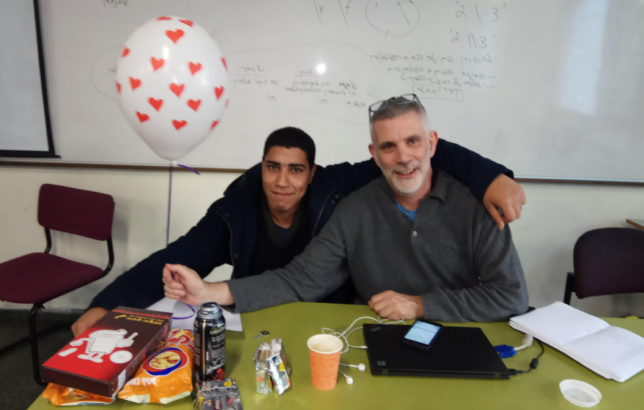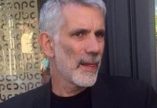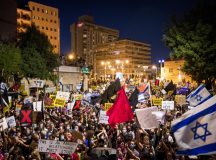William Kolbrener is professor of English Literature at Bar Ilan University. He has written widely on the literature, politics & philosophy of the Renaissance in England, as well as Jewish philosophy. A public research university in the city of Ramat Gan in the Tel Aviv District, Bar Ilan is Israel’s second-largest academic institution with 18,000 students, around 20 per cent of whom are Arab citizens of Israel.
Keeping politics out of the classroom is basic, especially in Israel where I teach, but yesterday, I was unable to hide my distress that, whatever the eventual results, Trump’s autocratic aspirations were affirmed by 70 million Americans, enabled primarily by the vulgar populism of his base, which enable his principal interests, and never hidden interest, wealth and power. The base is not alone: Trump Republicans in three-piece suits with their large 401 (k)s may try to disassociate themselves from the thugs toting AK-47s, but they are in the same club. I let myself talk about Trump in class, because, for me, it is not about just politics anymore, one candidate over another, but the intrusion of fundamentalism into political life, and the not-so-slow erosion of liberal institutions.
A colleague cancelled class on Wednesday morning, remembering a similar morning in 2016 when phones buzzed with news of Trump’s presidential victory. He did not want to be blindsided again; he was taking the incoming results even harder than me.
For me, however, it made more sense to teach my classes, one on the Greeks, one on Elizabethan literature, Homer and the Renaissance sonnet. Zoom is not ideal for many reasons, but students are present, their faces, as it were, in your face. Existential dread in the age of COVID is palpable – even more evident in Zoom close-ups. But teaching is a relief from the dread and hopelessness that politics in America, and often in Israel, represent. Meaning comes – this is the greatest educational value in the liberal classroom – in the process of reading and understanding. We have conversations with the great minds of the past, and through them acquire the words to have conversations with each other. The Humanities classroom is one of the great achievements of Western civilisation; it is a refuge from those renouncing the possibility of conversation and diversity, moreover, for those who deny the possibility of a future.
If I were in America, I fear things may have been different, because not just the authoritarian right, but the populist left, are responsible for the death of liberal education, the former externally, undermining the mechanisms of liberal institutions, the latter from within, as progressive professors use the Humanities classroom to undermine the values of the Humanities. In an Israeli classroom, strangely enough, I can talk about this horrible divide, and somehow in Israel’s fractured and divided society, find more reason for hope.
Humanists in Israel are not yet bored by liberalism as their counterparts are in America, where the protections of liberalism have shielded the latter from the consequences of a world without liberalism. The Middle East is just such a world. Even in Israel, living out every day the paradoxes and contradictions of a Jewish democracy, there is no native liberal political tradition. When my students, young Muslims, Christians, and Jews have the chance to be part of a conversation with each other, for many for the first time, they may be hesitant at the beginning, but in the end, many welcome it, experience it, and value it. In Israel, where the prospect of real aggressions loom so large, students do not bother about micro-aggressions, monitored in America by an ever-fussier political correctness. Trigger warnings – my students don’t grasp the concept – are also an unaffordable luxury here in Israel: there is rather a conscious, sometimes zealous guarding of the civility of classroom discussion which many understand, if not openly acknowledge, to be fragile. There is often real violence just down the block.
But what does a sonnet by a 16th century poet have to do with anything? The answer is everything. In teaching reading, which requires both focus and receptivity – a refined form of generosity – we learn to give attention to the perspectives of others. When those around us are committed to misunderstanding, or refusing to understand because perceiving someone to not be just like them, we try to listen and understand. This method was perfected by the first humanists of the Renaissance, Christians, who were willing to encounter a foreign culture – pagans – and read them, and learn from them, and become better versions of themselves because of that encounter. They were not afraid of encounters with otherness, they sought it out, and were transformed as a result. This ideal of the Humanities is lived in the process of reading, bringing the past into our presents so we can make our futures. It transforms and lives in the process of learning from each other as we read. Good teachers don’t provide safety from challenges that such encounters bring, but they provide students a place of trust where they feel safe to allow themselves to be challenged.
Illiberal liberal America of the Trump era has forgotten what our Israeli students know implicitly – the fragility of democracy, and the fragility of the conditions that place us in conversations with people different from ourselves. We are not, as some bad pedagogues claim, a family, but in the classroom, we aspire to be a community where we encounter divergent perspectives and traditions, perhaps even learn from each other in the process. Sometimes it seems futile, especially now when the macabre co-dependent dance of political extremes the world over eats away at liberal education from both sides. But when in class, learning and understanding together, especially in our diverse classrooms in Israel, that is all there is, and all that matters.
I am glad I taught.




































Thank you. I wish I could establish such communities in all my classes.